英语人教版八年级下册HAVE YOU EVER
人教版新目标英语八年级下册:Unit 9《Have you ever been to museum》 讲解+练习题目+答案
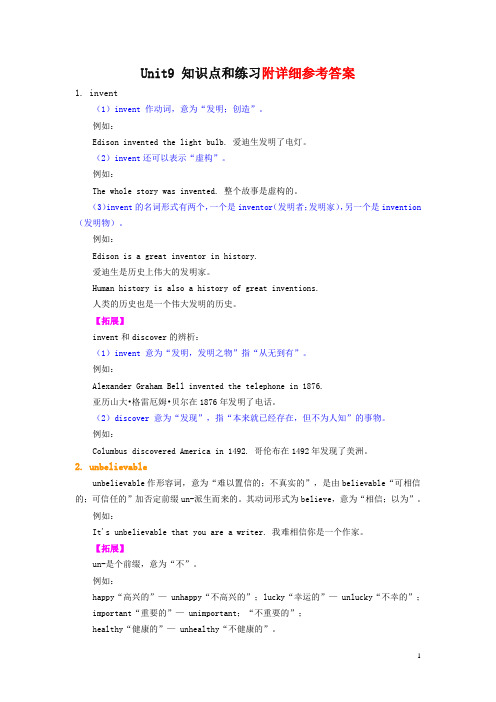
Unit9 知识点和练习附详细参考答案1. invent(1)invent 作动词,意为“发明;创造”。
例如:Edison invented the light bulb. 爱迪生发明了电灯。
(2)invent还可以表示“虚构”。
例如:The whole story was invented. 整个故事是虚构的。
(3)invent的名词形式有两个,一个是inventor(发明者;发明家),另一个是invention (发明物)。
例如:Edison is a great inventor in history.爱迪生是历史上伟大的发明家。
Human history is also a history of great inventions.人类的历史也是一个伟大发明的历史。
【拓展】invent和discover的辨析:(1)invent 意为“发明,发明之物”指“从无到有”。
例如:Alexander Graham Bell invented the telephone in 1876.亚历山大•格雷厄姆•贝尔在1876年发明了电话。
(2)discover 意为“发现”,指“本来就已经存在,但不为人知”的事物。
例如:Columbus discovered America in 1492. 哥伦布在1492年发现了美洲。
2. unbelievableunbelievable作形容词,意为“难以置信的;不真实的”,是由believable“可相信的;可信任的”加否定前缀un-派生而来的。
其动词形式为believe,意为“相信;以为”。
例如:It's unbelievable that you are a writer. 我难相信你是一个作家。
【拓展】un-是个前缀,意为“不”。
例如:happy“高兴的”— unhappy“不高兴的”;lucky“幸运的”— unlucky“不幸的”;important“重要的”— unimportant;“不重要的”;healthy“健康的”— unhealthy“不健康的”。
人教新目标英语八年级下册讲义—Unit 9 Have you ever been to a ……

新目标八年级下册Unit 9 Have you ever been to a museum ?讲义一、重点单词1. amusement n. 娱乐; 游戏2. somewhere adv. 在某处; 到某处3. camera n. 照相机; 摄影机; 摄像机4. invention n. 发明物5. invent v. 发明; 创造1. unbelievable adj. 难以置信的; 不真实的2. progress n. 进步; 进展3. rapid adj. 迅速的; 快速的4. unusual adj. 特别的; 不寻常的5. toilet n. 坐便器; 厕所6. encourage v. 鼓励7. social adj. 社会的8. peaceful adj. 和平的; 安宁的9. performance n. 表演; 演出10. perfect adj. 完美的; 完全的11. itself pron.(it的反身代词) 它自己12. collect v. 收集; 采集13. German adj. 德国的; 德语的; 德国人的n. 德语; 德国人14. theme n. 主题15. ride n. 供乘骑的游乐设施; 短途旅程16. province n. 省份17. simply adv. 仅仅; 只; 不过18. fear v. & n. 害怕; 惧怕19. whether conj. 不管......;还是); 或者......(或者); 是否20. Indian adj.印度的 n. 印度人21. Japanese adj.;日本的; 日本人的; 日语的n. 日本人; 日语22. equator n. 赤道23. whenever conj. 在任何......时候; 无论何时24. spring n. 春天25. mostly adv. 主要地; 通常26. location n. 地点; 位置二、短语归纳1.at night在夜晚2.in a more natural environment在一个更加自然的环境中3.all year round 全年4.be far from 离……远5.in the dark 在黑暗中6.in the past 在过去7.have been to sp. 去过某地8.science museum 科学博物馆9.history museum 历史博物馆10.amusement park 游乐园11.go somewhere different 去不同的地方12.go skating 去滑冰13.take the subway 坐地铁14.a great way to spend a Saturday afternoon一个过周六下午的好方法15.all the old movie cameras所有的古老的电影摄影机16.learn about sth.解有关……的情况17.on the weekend 在周末18.camp in the mountains 在大山里露营19.put up a tent搭帐篷20.in such a rapid way 以如此迅猛的方式21.different kinds of各种各样的22.development of toilets 厕所的发展23.social groups 社会团体24.the tea art performances茶艺表演25.make a perfect cup of tea with beautiful tea sets用漂亮的茶具沏一杯完美的茶26.a nice place to enjoy tea 一个品茶的好地方27.thousands of 数以千计的28.International Museum of Toilets国际厕所博物馆29.the Terracotta Army 兵马俑30.Southeast Asia东南亚31.Night Safari 夜间动物园32.three quarters 四分之三33.an English-speaking country一个讲英语的国家34.have problem doing sth. 做某事很困难35.during the daytime在白天36.a couple of times 好几次37.right now 现在;目前38.an amusement park with a special theme一个有特别的主题的游乐园39.walk around the park 在公园里到处走40.hear of 听说41.take a ride兜风42.another province另一个省43.the Bird’s Nest鸟巢44.encourage sb. to do sth.鼓励某人做某事45.on the one hand... on the other hand.一方面,另一方面三、句型集萃1.a great way to do sth一个做某事的好办法2.It’s unbelievable that很难相信……3.watch sb do sth.看某人做了某事4.encourage sb to do sth鼓励某人做某事5.as..as和。
人教版八年级英语下册《Unit 9 Have you ever been to an amusement park.(通用)》教案_1
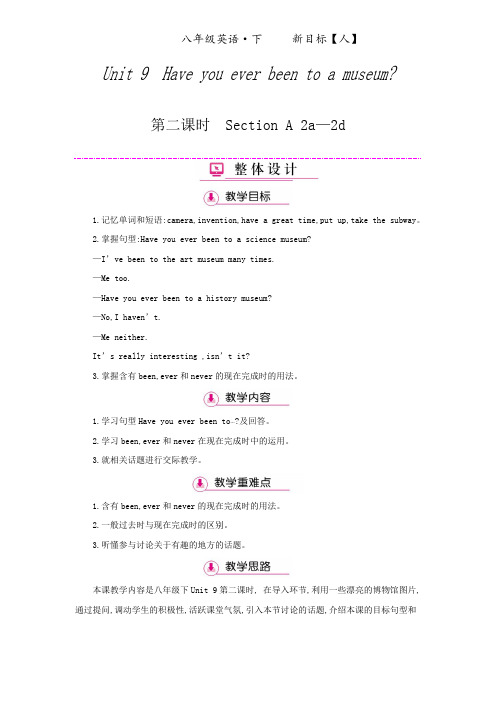
八年级英语·下新目标【人】Unit 9 Have you ever been to a museum?第二课时Section A 2a—2d1.记忆单词和短语:camera,invention,have a great time,put up,take the subway。
2.掌握句型:Have you ever been to a science museum?—I’ve been to the art museum many times.—Me too.—Have you ever been to a history museum?—No,I haven’t.—Me neither.It’s really interesting ,isn’t it?3.掌握含有been,ever和never的现在完成时的用法。
1.学习句型Have you ever been to…?及回答。
2.学习been,ever和never在现在完成时中的运用。
3.就相关话题进行交际教学。
1.含有been,ever和never的现在完成时的用法。
2.一般过去时与现在完成时的区别。
3.听懂参与讨论关于有趣的地方的话题。
本课教学内容是八年级下Unit 9第二课时, 在导入环节,利用一些漂亮的博物馆图片,通过提问,调动学生的积极性,活跃课堂气氛,引入本节讨论的话题,介绍本课的目标句型和单词,在听力环节,注重对学生听力策略的指导,消除学生对听力的“恐惧”心理,让学生能够高效做题。
2d教学是本课综合运用的体现。
通过学习词组、重点句到对话的填空让学生的学习有渐进的过程;抽取学生进行角色扮演,对学生是知识升华的过程。
设计教学PPT,录音机,图片,多媒体。
StepⅠ.Lead in[设计意图]调动学生情感,激活他们头脑中关于过去去过的地方的情感,导入新授。
Leading inT:Boys and girls,do you like traveling?S:Yes.T:Great! Most of you like traveling very much.Me too.Look at the pictures.I went to a lot of places last year.Guess where I went? Use “have/has been to”.S1:You have been to Shanghai.S2:I know you have been to the space museum.S3:You have been to the amusement park.S4:You have been to the zoo.S5:…T:Great! All of you did well.I have been to so many interesting places.Which of these places would you like to visit? Please rank them 1 to 6.space museumhistory museumart museumwater parkzooamusement parkS:…[设计意图]通过情境引入,激发学生情感,便于导入新授内容。
新课标人教版八年级英语下册Unit 9 Have you ever been to an amuse

—So did Tina.
中国地图
蒂娜也去了。
—He has been a soldier for two years.
要点点拨
他已经当了两年兵了。
go inline skating 滑旱冰
—So have I.
我也是。
全析提示
3.Look at the map of the town.Listen and circle the places 助动词 have 和 has 可以与前面的
you hear.
主语缩略’ve 和’s。
看城镇的地图。听录音并圈出你听到的地方。
如:we’ve,they’ve,he’s,
water world 水上世界
it’s 等。
city library 城市图书馆
have not 常缩略为 haven’t,has
fun times amusement park
如果说“欢迎回家”该怎么说呢?
把 1a 中你的回答和你搭档的回答对照一下。
Wele back home!
4.For me,“I have to!” is number two.
对我来说“I have to!”是第二位的。
要点点拨
5.Listen to a teacher interview a student.Circle the newsletter 业务通讯;新闻信札
route“路线、小路、小巷”,使
The main attraction was a Charlie Chaplin film.
用 X 围也较小。course 表示船的
吸引人的主要是查理·卓别林的电影。
“航道”或飞机的“航线”。
The idea of being a teacher has little attraction to young
人教版英语八年级下册Unit 9《Have you ever been to a museum》教学
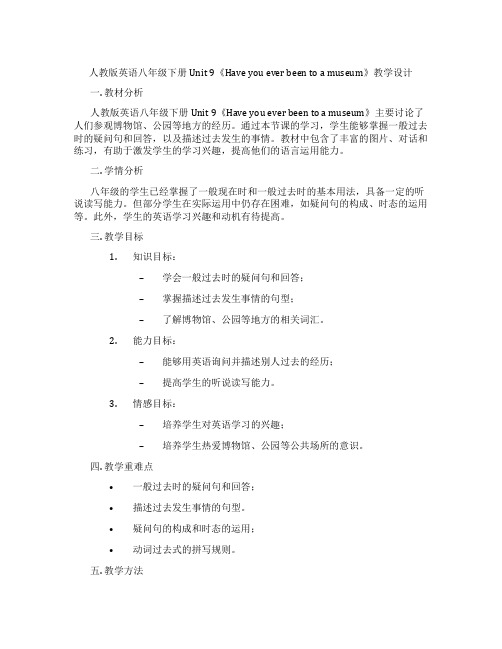
人教版英语八年级下册Unit 9《Have you ever been to a museum》教学设计一. 教材分析人教版英语八年级下册Unit 9《Have you ever been to a museum》主要讨论了人们参观博物馆、公园等地方的经历。
通过本节课的学习,学生能够掌握一般过去时的疑问句和回答,以及描述过去发生的事情。
教材中包含了丰富的图片、对话和练习,有助于激发学生的学习兴趣,提高他们的语言运用能力。
二. 学情分析八年级的学生已经掌握了一般现在时和一般过去时的基本用法,具备一定的听说读写能力。
但部分学生在实际运用中仍存在困难,如疑问句的构成、时态的运用等。
此外,学生的英语学习兴趣和动机有待提高。
三. 教学目标1.知识目标:–学会一般过去时的疑问句和回答;–掌握描述过去发生事情的句型;–了解博物馆、公园等地方的相关词汇。
2.能力目标:–能够用英语询问并描述别人过去的经历;–提高学生的听说读写能力。
3.情感目标:–培养学生对英语学习的兴趣;–培养学生热爱博物馆、公园等公共场所的意识。
四. 教学重难点•一般过去时的疑问句和回答;•描述过去发生事情的句型。
•疑问句的构成和时态的运用;•动词过去式的拼写规则。
五. 教学方法1.情境教学法:通过创设情境,让学生在实际语境中感受和运用英语;2.交际法:鼓励学生参与课堂互动,提高他们的口语表达能力;3.任务型教学法:通过完成任务,培养学生运用英语解决问题的能力;4.游戏教学法:通过趣味游戏,激发学生的学习兴趣。
六. 教学准备1.教学课件:制作课件,包含图片、动画、练习等;2.教学道具:准备相关场所的图片、卡片等;3.音频材料:下载相关听力材料,如录音、歌曲等;4.课堂练习:准备相应的练习题,巩固所学内容。
七. 教学过程1.导入(5分钟)–教师展示一张博物馆的图片,询问学生是否去过博物馆,引导学生谈论自己的经历。
2.呈现(10分钟)–教师展示课件,呈现本节课的主要内容,包括博物馆、公园等地方的词汇以及一般过去时的疑问句和回答。
新课标人教版八年级英语下册Unit 9 Have You Ever Been to an Amuse

Unit 9 Have You Ever Been to an Amusement Park?一、学习目标:1.掌握现在完成时的用法;2.了解一般过去时、现在完成时和现在完成进行时的意义的区别;3.能够准确使用多种时态谈论自己的经历。
二、学习重点难点:1. 现在完成时由主语+have/has+过去分词构成。
其主要用法如下:I.在未指明具体时间的情况下,现在完成时动词通常可以表示在说话之前已经完成,而后果或影响至今仍存在的动作。
例如:The concert has started. 音乐会已经开始。
I have had breakfast. 我已吃过早饭。
注意:have gone to 和have been to 在意义上有区别。
例如:He has gone to Hong Kong. 他到某某去了。
(他已前往某某,或在途中,或已到达。
说话人暗示他现在不在现场。
)He has been to Hong Kong. 他曾到过某某。
(说话人认为他过去到过某某,现在已不在该地。
言外之意他对某某有所了解。
)II. 现在完成时动词可以表示开始于过去持续到现在(也许还会继续进行下去)的动作或状态。
例如:1) I have studied English since last year. 我从去年开始学习英语。
2) She has lived in Beijing for five years. 她住在已经五年了。
注意:e, go , leave, arrive, buy, lose, receive, join, die, bury 和marry 等动词所表示的动作是一时的,不能延续的,故不能与for …,since …等开头的表示一段时间的状语连用。
不过,这些词用于否定句则可以与表示持续的时间状语连用,即动作的不发生是可以持续的。
例如:不能说:*He has e to Beijing for two years.*He has bought that book for three weeks.*He has joined the Army for one and a half years.*His grandma has died for nine months.* I have received his letter for a month.可以说:He has been in Beijing for two years.He has had that book for three weeks.He has been in the army for one and a half years.His grandma has been dead for nine months.I haven't received his letter for almost a month.或者:It is two years since he came to Beijing.It is three weeks since he bought that book.It is one and a half years since he joined the Army.It is nine months since his grandma died.2. 现在完成时把过去的动作和现在的结果联系起来,一般过去时只限于表示过去的动作本身,与现在的结果无关。
英语人教版八年级下册Have you ever been to a museum

Exercise.
1. He has studied English for 4 years. (改为一般疑问句) _______ he _______ English for 4 years? 2. My parents have been to America. (对画线部分提问) _____ _____ _____ parents _____? 3. Lucy has traveled to another province. (改为否定句) Lucy ____ ____ to another province.
Have/has been to// have/has gone to
• Have (has) been to 表示“曾经去过某地”, 说话时已不在去过的地方。(去过) • Have (has) gone to 表示 “已经到某地去 了”,不在说话的地方。(去了) • Eg: I have been to Shanghai.我去过上海。 • She has gone to Wuhan. 她到武汉去了。 • He _________to Beijing. So he isn’t here. • I __________to the zoo many times.
• He has been to a science museum,_____ _____./_______ _______ _______.(我也是) • They haven’t been to a history museum,_______ _______./_______ ______ _______.(我也是) • me, too./ so have I. • me,neither./ neither have I.
英语人教版八年级下册9 Have you ever been to ...

B: Yes, I have.
A: Have you tried Beijing Duck? B: Yes, I love them very much.
4a. Put the correct forms of the verbs in the blanks.
1. A: Do you want __________ to come (come) to the space museum? B: No, I’ve already ______ been (be) there three times. 2. A: Have you ________ (see) the robots at the seen science museum? B: Yes, I ______ went (go) there last weekend.
A: Have you visited Beijing ?
B: Yes, I went there last summer.
A: Have you been to the Palace Museum ?
B: Of course. It was fantastic.
A: Have you seen Qianqing Gong?
3. A: Let’s ________ spend (spend) the day at the zoo. B: Well, I’ve already _______ been (be) there a couple of times, but I’m happy______ to go (go) again. 4. A: How about _________ (go) to the art going museum? There are some special German paintings there right now. B: Sure. When do you want _______ to go (go) ? 5. A: Have you ever _________ (visit) the visited history museum? B: No, I’ve never________ (be) there. been
八年级英语下册Unit9Haveyoueverbeentoanamusementpark词汇详细用法人教新目标版

Unit 9 Have you ever been to an amusement park ?68页1.amusement [ u ] 娱乐、消遣an amusement park 游乐场Have you ever been to an amusement park? 你曾经去过一个游乐场吗?Fun Times Amusement Park 欢乐时光游乐场。
复习have been to 去过,回来了have gone to 去了,现在不在这里have been in 去了,还在那里2. neither① adj. pron 二者都不Neither answer is correctNeither of the answers is / are correct.Which do you like? Neither I think they’re both ugly.② adv. 也不I don’t know. Me neither. I don’t know, either.70页3. Disneyland 迪斯尼乐园(前无冠词)Have you ever been to Disneyland?In fact, there are now several different Disneyland amusement parks around the world. 事实上,现在世界上有好几处不同的迪斯尼游乐场。
around the world = all over the worldacross China = all over China4. Mickey Mouse 米老鼠5. Donald Duck 唐老鸭6. character①性格I know his character very well.②汉字Chinese characters③人物、角色famous characters from Chinese historyDisney characters 迪斯尼人物Mickey Mouse and Donald Duck are famous Disney characters.7. seen see的过去分词。
新人教版八年级英语下册 Uni Have you ever been to a museum全单元

精选课件
15
Amy: I’ve recently been to a very unusual museum in India, the International Museum of Toilets. I just couldn’t believe my eyes when I saw so many different kinds of toilets there. The museum
Conversation 1
1. Tina went to the space museum last year. T/F 2. John has never been to the space museum. T/F 3. They are going to take the subway. T/F
精选课件
10
2c. Look at the map in 2a and make conversations about the places.
A: Have you ever been to the space museum? B: Yes, I have. How about you? A: No, I haven’t. B: Oh, it’s fantastic. Let’s go tomorrow. A: OK. How are we going to get there? B: We can take the subway.
They have information about
different computers and who invented them. The
old computers were much bigger. It’s unbelievable
人教版八年级英语下册Unit9 Have you ever been to a museum知识点梳理及单元复习
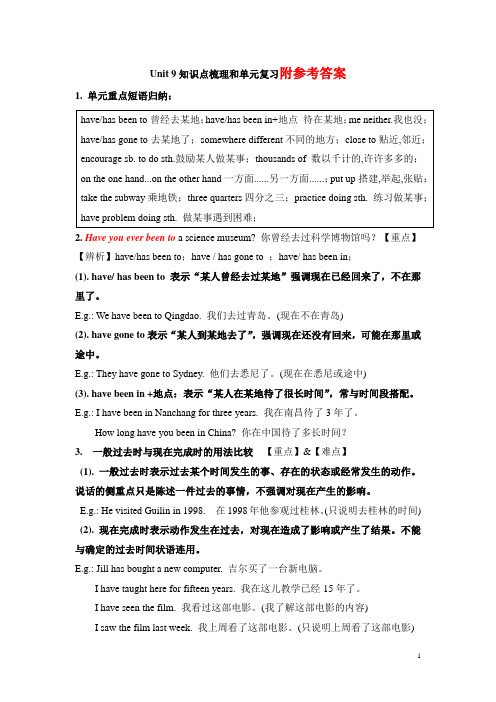
Unit 9知识点梳理和单元复习附参考答案1. 单元重点短语归纳:have/has been to曾经去某地;have/has been in+地点待在某地;me neither.我也没;have/has gone to去某地了;somewhere different不同的地方;close to贴近,邻近;encourage sb. to do sth.鼓励某人做某事;thousands of 数以千计的,许许多多的;on the one hand...on the other hand一方面......另一方面......;put up搭建,举起,张贴;take the subway乘地铁;three quarters四分之三;practice doing sth. 练习做某事;have problem doing sth. 做某事遇到困难;2. Have you ever been to a science museum? 你曾经去过科学博物馆吗?【重点】【辨析】have/has been to;have / has gone to ;have/ has been in;(1). have/ has been to 表示“某人曾经去过某地”强调现在已经回来了,不在那里了。
E.g.: We have been to Qingdao. 我们去过青岛。
(现在不在青岛)(2). have gone to表示“某人到某地去了”,强调现在还没有回来,可能在那里或途中。
E.g.: They have gone to Sydney. 他们去悉尼了。
(现在在悉尼或途中)(3). have been in +地点:表示“某人在某地待了很长时间”,常与时间段搭配。
E.g.: I have been in Nanchang for three years. 我在南昌待了3年了。
How long have you been in China? 你在中国待了多长时间?3. 一般过去时与现在完成时的用法比较【重点】&【难点】(1). 一般过去时表示过去某个时间发生的事、存在的状态或经常发生的动作。
人教版八年级下册Unit 9 Have you ever been to an amusement park 第一课时课件
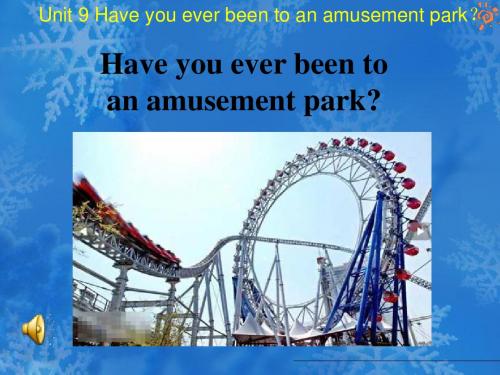
Unit 9 Have you ever been to an amusement park? Ask your classmates whether(是否) Survey &report they have been to these places.
Space Water Name Aquarium Zoo Museum World
[ ’nið ə / ’n ð ə]
Unit 9 Have you ever been to an amusement park?
1、How many places do they mention? Five. 2、Have they ever been to these places? Space museum Claudia Aquarium Zoo
--Have you ever by westlife
Summary
have/has been to: (曾经)去过(已回来)
I have been to a water park.
I have been to a space museum.
Unit 9 Have you ever been to an amusement park?
1. Recite the new words of P68-69. 2. Write your own conversatioБайду номын сангаас according to 1a.
Aixi Lake Bridge Bayi Square Nanchang Zoo
Unit 9 Have you ever been to an amusement park?
Question: Do you know where it is?
英语八年级下册 Unit9 Have you ever been to a museum单元短语过关

人教版英语八年级下册第九单元短语过关Unit 9 Have you ever been to a museum?1. a science museum 一个科学博物馆2. a space museum 一个太空博物馆3. a history museum 一个历史博物馆4.an art museum 一个艺术博物馆5.water park 水上乐园6.amusement park 游乐场7.somewhere different 某个不同的地方;不定副词,后接形容词;例如:For my next vacation , I ‘d like to go somewhere different. 下次度假,我想去个不同的地方。
st year 去年9.at night在夜晚;at noon在中午10.have \ has been to ... 去过...;例如:I have been to a wonderful placewith big gardens. 我去过一个带有很多花园的美景之地。
have \ has gone to ... 去了;例如:She can’t find Mr. Green , he has gone to Beijing. 她不能找到格林先生,他去了北京。
11.go skating 去滑冰12.take the subway 乘坐地铁13.camp in the mountains 在山上野营;例如:During the summervacation , we camped in the mountains and it was fun. 暑假期间,我们在山上野营,非常有趣。
14.put up the tent 搭建帐篷;put up 还可以表示张贴;例如:They putup their tent and slept under the tree.他们搭建好帐篷,在树下睡了。
人教版英语八年级下册 Unit 9 Have you ever been to a museum
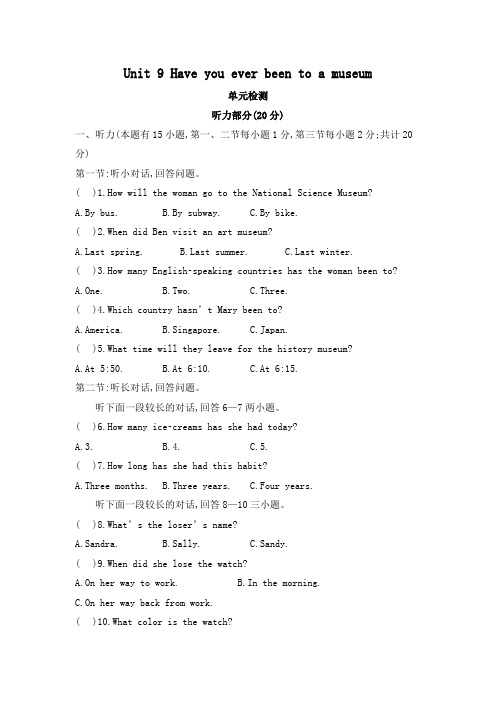
Unit 9 Have you ever been to a museum单元检测听力部分(20分)一、听力(本题有15小题,第一、二节每小题1分,第三节每小题2分;共计20分)第一节:听小对话,回答问题。
( )1.How will the woman go to the National Science Museum?A.By bus.B.By subway.C.By bike.( )2.When did Ben visit an art museum?st spring.st summer.st winter.( )3.How many English⁃speaking countries has the woman been to?A.One.B.Two.C.Three.( )4.Which country hasn’t Mary been to?A.America.B.Singapore.C.Japan.( )5.What time will they leave for the history museum?A.At 5:50.B.At 6:10.C.At 6:15.第二节:听长对话,回答问题。
听下面一段较长的对话,回答6—7两小题。
( )6.How many ice⁃creams has she had today?A.3.B.4.C.5.( )7.How long has she had this habit?A.Three months.B.Three years.C.Four years.听下面一段较长的对话,回答8—10三小题。
( )8.What’s the loser’s name?A.Sandra.B.Sally.C.Sandy.( )9.When did she lose the watch?A.On her way to work.B.In the morning.C.On her way back from work.( )10.What color is the watch?A.Yellow.B.White.C.Black.第三节:听独白,回答问题。
八年级英语下册Unit9Haveyoueverbeentoamuseum单元语法知识梳理人教版

Unit 9 Have you ever been to a museum现在完成时(Ⅱ)1.现在完成时表示经历的用法现在完成时常用have been to(去过),ever(曾经),never(从没)等表示经历。
用法说明示例have / has been to表示去过某地,可以与never,ever,just,once等连用。
Mr. Smith has ever been to China three times.史密斯先生曾去过中国三次。
ever常用于现在完成时的一般疑问句中,放在主语之后,过去分词之前。
Have you ever visited the Palace Museum? 你曾参观过故宫博物馆吗?never表示否定,用在助动词have / has之后,过去分词之前。
表示否定的简短回答可以用neither。
—I have never been to Hong Kong.我从来没去过香港。
—Me neither.我也没去过。
2.have/ has been to与have / has gone to的用法区别用法说明示例have/ has been to意为“去过某地”,表示去过某地,现在已经回来了,通常与表示次数的状语连用,如twice,several times,ever,never等She has been to Europe twice.她去过欧洲两次。
(已经回来了)I have never been to the Great Wall.我从未去过长城。
have / has gone to意为“去了某地”,表示到某地去了,强调说话时去某地的人不在场(可能在途中,也可能已到达)。
—Where is Jim? 吉姆在哪里?—He has gone to England.他去英国了。
(现在不在这里)若have/ has been to或have / has gone to后接副词,则省略to。
Have you ever been to a museum_知识点汇总-人教版英语八年级下册

Unit 9 Have you ever been to a museum?一、短语归纳1.science museum科学博物馆2.history museum历史博物馆3.space museum 太空博物馆4.art museum美术馆5.water park水上公园6.amusement park游乐场7.somewhere different某个不同的地方8.have a great time玩得高兴9.take the subway乘地铁10. learn about了解11.put up搭建;支起12. color movies彩色电影13. a great way to do sth一个做某事的好方式/好方法14.in such a rapid way用如此快速的方式15.It’s unbelievable that:很难相信16.be able to do sth能够做某事17.think about 考虑18.many different kinds of许多不同种类的19. in the future在将来未来20. a couple of 少数;几个21.a perfect cup of tea一杯完美的茶22. something important重要的东西23.thousands of数以千计的24. watch sb. do sth观看某人做了某事25.want to do sth想要做某事26.encourage sb. to do sth鼓励某人做某事27.love doing sth喜欢做某事28.see sb doing sth看见某人正在做某事29.the best time to do sth做某事的最佳时间30.have problems (in) doing sth做某事有困难31. choose to do sth选择做某事32. tell sb. to do sth告诉某人做某事33.take a holiday度假34. at night 在晚上35. more than 超过;多于36.three quarters 四分之三37. on the one hand…on the other hand 一方面…另一方面38. an English-speaking country一个说英语的国家39. during the daytime 在白天40. wake up 醒来41. all year around一年到头42.close to靠近43. far from离…远44. the Great Wall长城45.the best time to do sth做某事的最好方式考点归纳考点1 辨析:have/ has been to have gone to have been in⑴have/ has been to + 地名“曾经去过某地” , 现在已经回到原地。
人教版英语八年级下册Unit9Have you ever been to a museum SectionB复习课件(共张31)
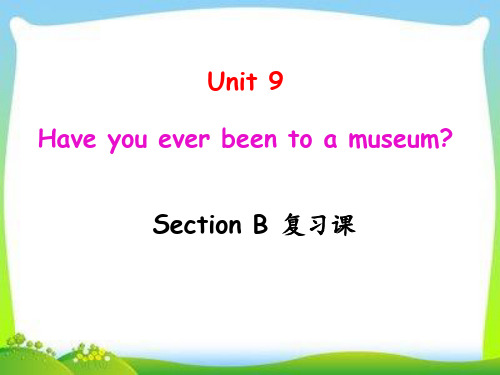
要点2
Indian 此处用作形容词,意为“印度的”。 Indian 还可用作名词,意为“印度人” India 用作名词,意为“印度”
归纳: 英语中,一些表示国家或地区的名词, 可加后缀-(a)n构成形容词,意为“......(人)的”
They have some pro.5b. lems _l_e_ar_n_i_n_g_ languages.
句型透析
1. Have you tried Chinese food? try sth. 尝试某事物
try小结
try one's best to do sth. 尝试某事物
try to do sth. 尽力做某事 try doing sth. 尝试做某事
3.我想去一个讲英语的国家度假。
I want to go on vacation in an __E_n_g_l_is_h_-_s_p_e_ak_in_g__c_o_u_n_tr.y
4.我们学校一年四季看起来都很漂亮。
Our garden looks beautiful __a_ll _y_e_ar_r_o_u_n_d_..
4. Maybe you fear that you won’t be able to find anything good to eat when you travel.
要点 fear 此处用作动词,意为“害怕,惧怕”, 后常接名词、动词不定时、V-ing 形式或 that 从句。
e.g. The little girl fears ___to__te_l_l her mother the truth. He fears _w__a_tc_h_i_n_g(watch) the thrillers.
英语人教版八年级下册Have you ever been to a museum.程夏姿

Thank you for listening.
Welcome to Dahong Ancient Road (大洪古道).
I have ever been to...
Where have you been?
Presentation
Have you ever been to...? Yes, I have./No,I haven’t.
An amusement park
Have you ever been to...? Yes, I have./No,I haven’t.
A chain game
1
A: Have you ever been to…? B: Yes, I have. / No, I haven’t.
3
2
the Great Wall
4
the palace museum
the Shaolin Temple
5
6
Huangshan
Shanghai
Sanya
Summary
History museum
Water park
Have you ever been to...? Yes, I have./No,I haven’t.
zoo
aquarium
Presentation
- 1、下载文档前请自行甄别文档内容的完整性,平台不提供额外的编辑、内容补充、找答案等附加服务。
- 2、"仅部分预览"的文档,不可在线预览部分如存在完整性等问题,可反馈申请退款(可完整预览的文档不适用该条件!)。
- 3、如文档侵犯您的权益,请联系客服反馈,我们会尽快为您处理(人工客服工作时间:9:00-18:30)。
the International Museum of Toilets toilet the Hangzhou National Tea tea setsMuseum tea preparation
tea art performance
Careful reading
What does Ken say about the American Computer Museum? (Para1)
一个令人放松和平静的地方 a relaxing and peaceful place
像喝茶本身一样令人享受 as enjoyable as drinking the tea itself
1)The most interesting museum:______________________ American Computer Museum 2)They have information about a.___________________ different computers b.___________________ who invented them 3)Technology has progressed in such a rapid way: a. the old computers were much bigger _____________ b. a special computer could play chess even better than humans _______________________________ c. I wonder how much more computers will be able to do in the future ________________________________________________
For example :
Introduce aΒιβλιοθήκη interesting place
The most interesting… I’ve ever been to is… . I just couldn’t believe my eyes when I saw… . It is unbelievable that … . Ving is just as enjoyable as doing … . I’ve finally realized … .
Which museum areunderlined you interested in ? Why ? 3c. Which of the words in the passage have the make (something) better Tell us in your own words with the help of these key words. following meanings?
become better
uncommon
V. adj. V.
quiet made quick
adj.
V. adj.
Share the
…
…
museum or place you have been to .
?
think of…
?
place
see… realize…
have learned that…
history and development ways to improve
It also encourages governments and social (社会的) groups to think about ways to improve toilets in the future.
Careful reading
She realized ____________________________ why her grandpa loves drinking tea and collecting tea sets ____________________________
Read loudly ! Listen carefully!
Homework
1. Level A:
2. Listen and read the passage.
2. Level B:
Go on improving the writing .
Test in class (当堂检测) 以如此快的方式 in such a rapid way 难以置信的是 It’s unbelievable that 下棋 play chess 在将来 in the future 许多不同种类的 many different kinds of …的历史和发展 the history and development of 鼓励某人做某事 encourage sb to do sth 思考 think about
progress in such a rapid way (v.) (adj.)
Careful reading
What can we learn at the International Museum of Toilets? (Para2)
different kinds
toilets
A. 挑战 B. 鼓励
science museum film museum nature museum
history museum
museum
art museum …
computer museum
space museum
What’s the full name of each museum? Fast reading the American Computer Museum
Why is the Hangzhou National Tea Museum a nice place to enjoy tea? (Para3)
relaxing and peaceful place (1) a ___________________
(2) watching the tea preparation is just as enjoyable as ____________________ drinking tea.
